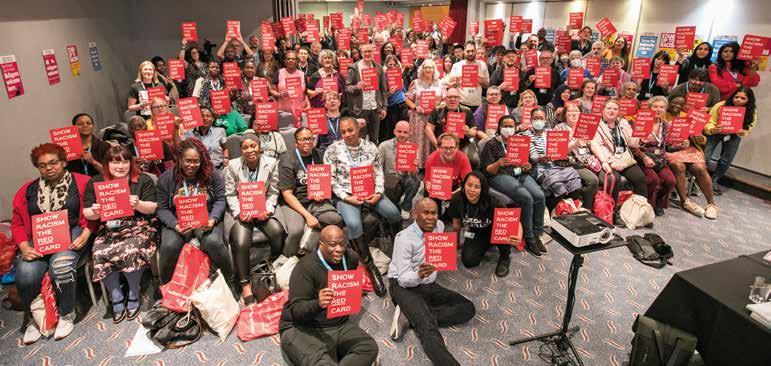
3 minute read
John Fisher School
43% of sporty girls quit as teens
A LACK of self-belief and fear of being judged are leading to young girls disengaging from physical exercise, according to new research.
A survey of 4,000 young girls and boys by charity Women in Sport found that 43 per cent of teenage girls who described themselves as ‘sporty’ at primary school have since disengaged from physical exercise, compared with just 24 per cent of boys.
The charity estimates this would equate to 1.3 million girls across the UK.
Sixty-eight per cent of these girls said they no longer exercised because they felt others were judging them, while 61 per cent lacked confidence and 43 per cent reported not feeling safe outside. All girls said exercising while on their period was challenging.
Women in Sport is calling for the sport, leisure and education sectors to give girls choice and control to feel empowered, bring a sense of adventure and discovery, and take the pressure off performance and winning.
n Visit bit.ly/3tDOT4U NEU members at John Fisher School in Croydon at a lunchtime protest. They were balloted for strike action after their employer, Southwark Archdiocese, cancelled a visit by gay author Simon James Green and removed members of the school’s governing body. NEU regional officer John Friend said the decision “sets a terrible precedent for LGBT+ rights and representation at the school”.
SIMPLE, cost-free changes in the workplace can make a huge difference to women struggling with menopause symptoms.
That was one of the key messages of the NEU’s fringe session Making menopause matter at work at the TUC women’s conference (9-11 March).
“Sometimes it is the small adjustments that make the difference and being in a workplace where the menopause is spoken about openly makes a huge difference,” said Sarah Vaughan, NEU branch and district secretary in Cheshire East.
For example, at one school the nylon tabards worn by cleaning staff were abandoned because for some women the material exacerbated menopause symptoms.
Other schools make sanitary products, soaps and deodorants freely available in the toilets, said Sarah, who helped the NEU develop its policy (neu.org.uk/menopause), which was launched on World Menopause Day on 18 October 2019.
The psychological and physical
symptoms of the menopause, which are wideranging in type and severity, include memory problems, hot flushes, anxiety and depression, continence problems and fatigue.
Sandra Bennett, who is based in the NEU’s employment rights unit, said that, as an equality and occupational health issue affecting a significant proportion of the education workforce, menopause is a trade union issue. Treatment related to the menopause can amount to unlawful discrimination on the grounds of sex, age and/ or disability, said Sandra, who helped devise the union’s menopause toolkit.
Ivy Scott, a member of the Black organising forum in the eastern region, said that six out of ten women say the menopause has had a negative impact on their life.
Ivy, who is holding meetings to raise awareness of the issues around menopause, added that the union needs to do more to find out about the experiences of Black women.
Portrayal of women in the media
Chair of the NEU’s women’s organising forum Heather McKenzie seconded a motion on femicide, proposed by entertainment union Equity.
The motion, which was passed, called on the TUC to assess and challenge the portrayal of women in media images, and in the stereotypical storytelling of women’s lives.
It also called for work with the TUC to: n demand the Government listen and urgently act to tackle the societal issue of women’s safety n commit adequate funding for re-education n support the work of Equity in calling on production companies across the entertainment industry to take an active stance against the discriminatory portrayal of women.










